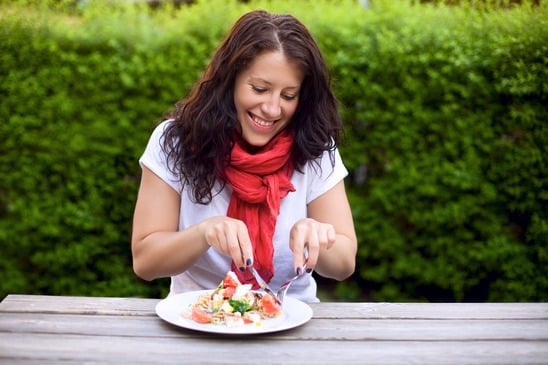
“Cooking for one is just plain boring,” an elderly patient recently told me. Day in, day out, she’s dining alone and tired of eating “the same old thing.”
Old, young, or somewhere in between, many adults are in a living situation that requires cooking just for themselves. Some people resort to eating out all the time or breaking out a bowl of cereal for dinner, but that can be a recipe for poor nutrition and possible weight gain.
Here are some ways to make low-quantity cooking a high-quality experience:
Make a plan.
Plan your meals a week in advance and shop from a list based on that menu. Build in at least one, unplanned “free” day. That way you can accept a last minute dinner invitation or work late at the office and you won’t have food going to waste at home. When planning your menu, take advantage of frozen entrees from the grocery store to pair with a homemade salad packed with raw vegetables or fresh fruits. You’ll also want to put late afternoon snacks on your menu. Good snack choices include celery dipped in a nut butter or hummus along with water or a no-calorie drink sweetened with sucralose.
Practice portion control.
Because fresh produce loses nutrients and taste quality over time, buy only as much as you can reasonably use within a few days. If a second weekly stop at the grocery store for more fresh vegetables isn’t doable, rely on large bags of frozen vegetables that allow you to take out only the amount that you need for a meal. Your freezer is also where you can bank large, homemade dishes divided into smaller portions before freezing. This gives you the opportunity to enjoy your special lasagna or meatloaf recipe without being stuck eating leftovers for a week straight.
Explore new recipes online.
A benefit of singleton cooking is that you have only one palate to please, but you can also get in a rut. Now is the time to expand your culinary horizons by searching the internet for new small quantity recipes and ethnic food recipes. Sites like allrecipes are a good place to start.
Experiment with exotic.
Check out the offerings at farmers’ markets and international grocery stores for fruits, vegetables, herbs, and spices that you’ve never tried before. It’s also a chance to reacquaint yourself with fruits and vegetables that you stopped buying because you could never get anyone else to eat them. Fresh herbs and freshly ground spices can turn the simplest meal into something new and exciting.
 Ellen Stokes, MS, RD, LD is an award-winning video producer, director, and writer in addition to being a registered dietitian. Ellen writes and creates videos about nutrition education, food safety, menu planning, grocery shopping, and healthful cooking on a budget. Ellen has worked with organizations and companies including WebMD, the Partnership for Food Safety Education, and the University of Georgia Food Science Department. Ellen formerly worked for CNN as a writer and producer and teaches food safety and nutrition for Georgia State University. Check her out on Twitter @EllenS_RD.
Ellen Stokes, MS, RD, LD is an award-winning video producer, director, and writer in addition to being a registered dietitian. Ellen writes and creates videos about nutrition education, food safety, menu planning, grocery shopping, and healthful cooking on a budget. Ellen has worked with organizations and companies including WebMD, the Partnership for Food Safety Education, and the University of Georgia Food Science Department. Ellen formerly worked for CNN as a writer and producer and teaches food safety and nutrition for Georgia State University. Check her out on Twitter @EllenS_RD.




